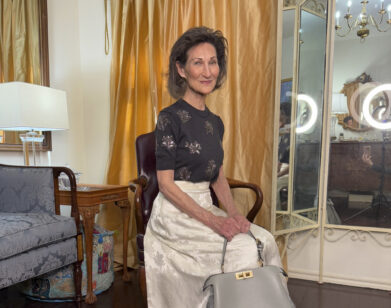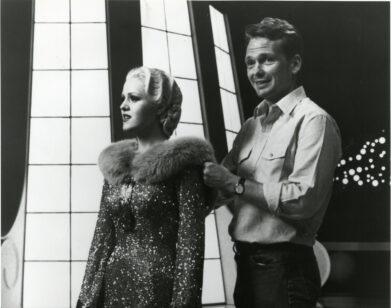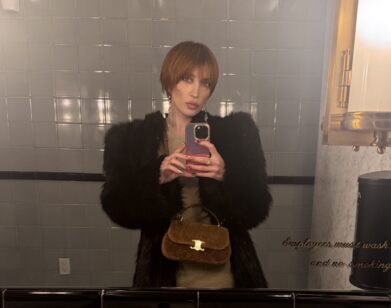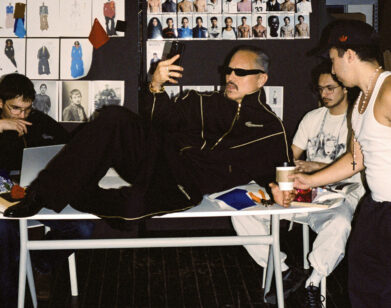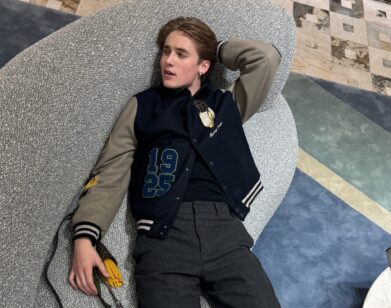Duality Junkie Is Bringing Back Booty Sag
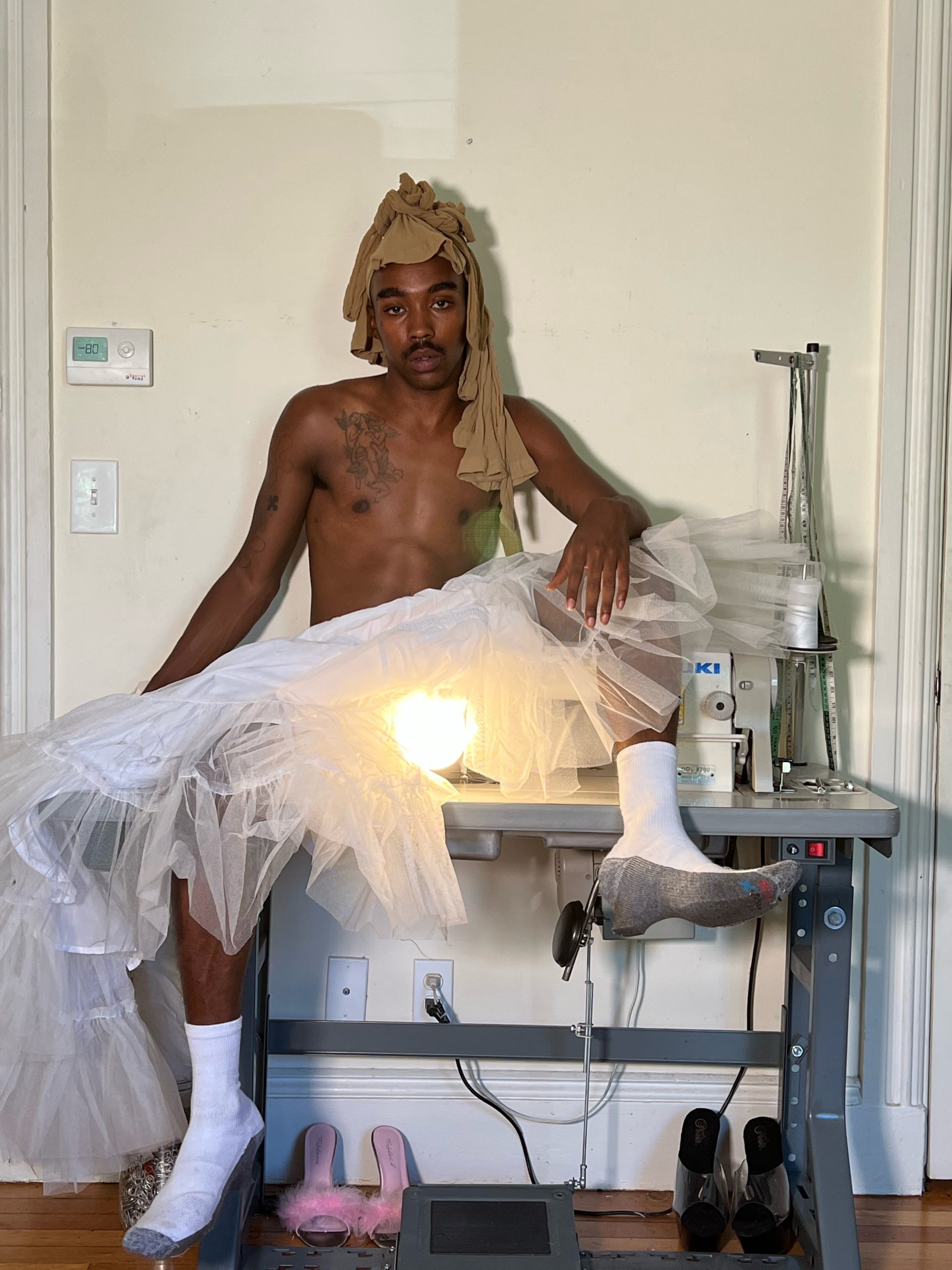
Photo courtesy of @dualityjunkie.69
Sagging boxers are like “men’s cleavage” to DJ Chappel, the multidisciplinary designer known to his Instagram followers as @Dualityjunkie.69. Chappel makes unisex clothes based on the two sides of his own experiences: his time in and out of the closet, and his time in and out of New York City. Mining the early aughts for inspiration, the designer holes himself up in his studio for days on end, creating designs that warp the styles he saw Black men wearing as a kid growing up on the Lower East Side—the plaid boxers, the booty sag, the polo shirts—and transforming them into pieces that reflect the private aspirations and hopes of the Black queer kid he once was. After being accepted into a Pittsburgh dance conservatory, Chappel landed a side job in the costume department of a Pittsburgh theater, where he began experimenting with salvaged materials and improvised silhouettes. Today, the New York-based designer continues to incorporate his dance background into his designs, taking every new piece he creates onto the roof of his building and dancing in it—“enchanting” it with joy and infusing it with strength for the Black queer community that supports his work. Chappel celebrates that same Afropresentism on his Instagram account—photos of friends strugging the New York streets in his meticulously-crafted double-brimmed hats and boxers-turned-skirts reveal the intimate bonds that unite Chappel’s chosen family. Here, we talked to the designer about the booty sag revival, his imaginative designs, and all things fab and enlightened.
———
MICAIH THOMAS: Tell me what makes you you.
DUALITY JUNKIE: My name is DJ Chappel. I’m born in Brooklyn, raised on the Lower East Side. Then I studied dance at a conservatory in Pittsburgh. My sophomore year, I got a job in a costume shop out there. The head customer had me looking for stuff in the archives. I would spend hours poking around this huge-ass attic, running through clothes. I ended up never really finding what they needed, and [I spent] hours just looking at everything. I wanted to explore that, so I ended up leaving school and moving back to New York. That’s when I started developing this Duality Junkie character. Now, I’m using costuming to bring these characters to life. It’s just me making things, then running up to my roof and dancing around in them. I just take everything I see and make it my own.
THOMAS: Super talented people are often ostracized within their home environments for being too cool and weird. Have you experienced this?
DUALITY JUNKIE: Literally. Absofuckinglutely. I grew up in the Lower East Side, and I had the privilege of being comfortably gay at a young age because I was exposed to it—but I also grew up in the hood. I moved out of the city because I really couldn’t do with a lot of weird interactions I was dealing with there. It’s like having to choose between expressing yourself and pretending. But [I’ve] come to a point where I just don’t give a fuck, you know what I mean? New York has helped me with that because I can just put my headphones on and I don’t care.
THOMAS: How have you healed from that?
DUALITY JUNKIE: Lately I’ve been saying I have 99 lives. I’m just, like, living all the lives. I did my straight life. When I was younger, the first parties I went to was hosted by some hood nigga in Brooklyn. I was definitely the only queer person at the door being like, I’m not a nigga, I’m not a bitch, I’m not paying $10, so am I getting in for free? Because I’m here to dance.
THOMAS: How do you incorporate dance into your process of making clothes?
DUALITY JUNKIE: I would just make something, go upstairs, and dance around in it. I’m enchanting the garments. Each garment—even the ones that I make for mass production. Me, you, every Black, gay boy went through similar traumas. We have similar aspirations. [I’m] finding ways to allow the next kids like us to heal through what we’ve done. Right now, I see myself as a future ancestor. Each thing that I create, each thing that I do is, in some way, for the future kids like me.
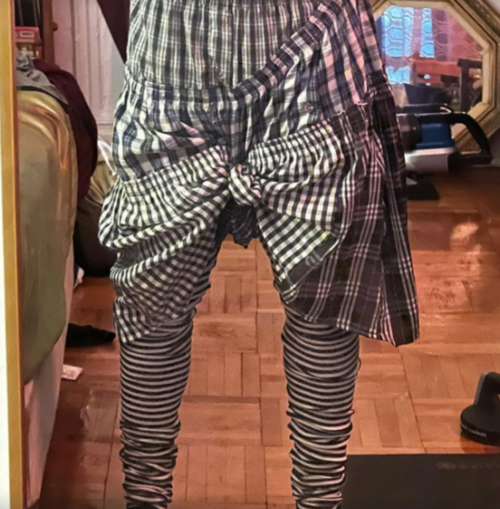
THOMAS: It feels like an ode to our forefathers, for real. I can see Noah wearing your clothes on the show, “Noah’s Arc.”
DUALITY JUNKIE: That’s literally what I was gonna say next. Exactly.
THOMAS: Dancing in your clothes seems to be your way of hacking into the mainframe of that spirit. Do you remember the first time that you tapped into that mindset?
DUALITY JUNKIE: During COVID when everybody was getting paid for staying at home, I was able to put some money aside and get a studio. I would go down there daily, sleep there sometimes, and just work, work, work, work. During that moment I was really charging. The reason why I’m doing what I’m doing today is because I took the time to just narrow in and focus on my spirit. Recently, I took all my new orders and I hung them all on a clothesline. As I was doing it, I smoked a blunt, the birds were chirping, and I was like, “Whoa, this is a ceremony. I’m hanging all these garments up and they’re taking up space. I’m talking to the universe and she’s responding.”
THOMAS: Exactly. Speaking of ceremonies, I have a theory that a lot of your references are from the Wednesday night Bible Study era in 2009.
DUALITY JUNKIE: [Laughs] Everything I do, I want it to feel like a memory. So I appreciate you saying that about 2009. That is a time when I was taking everything in.

THOMAS: Your work feels like Afropresentism. It’s anchored in the past and future—because anything that Black people do in the present is futuristic. Us laughing, dancing at a party, simply being, that’s Afropresentism.
DUALITY JUNKIE: Yeah, the latest thing I made was the Bubble Bag. I feel like that is so Black—past, future, present. I mean, I’m still blown away that this item exists, and that I made it, you know what I mean? I was going to the beauty supply store all the time, and all of those little things kind of added up to this sculptural, important artifact.
THOMAS: Sagging is also incorporated in all of your collections. I feel like our world could live in harmony if we just respected sagging. Thoughts?
DUALITY JUNKIE: I hated boxers growing up. I thought they were the worst things ever invented. It didn’t make any sense why you would stuff all that fabric into your pants. Drawing all that attention to your butt with all these plaids. It’s like, girl, that’s really a choice. You know what I mean? When I got a little bit more gay, it was like, okay, like, this is kind of hot. It’s men’s cleavage to me. It’s really kinky in a way. I’m always using what I have access to. I’m just finding new ways to continue weaving these ideas into my work.

